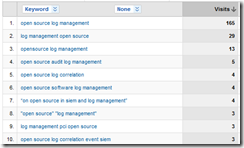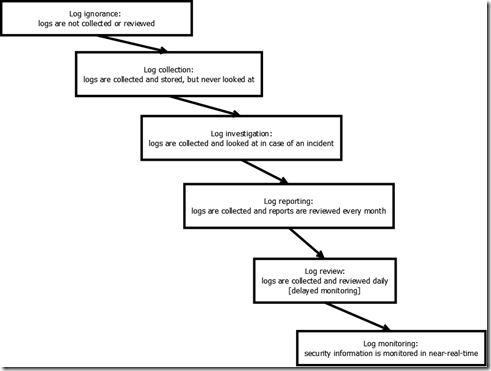Just as last year,
Workshop on the Analysis of System Logs is planned. This is the only venue where people who actually THINK about logs can share their findings. Even though it felt a little too academic to my taste at times,
2008 and
2009 events brought some good info (like
this gem here, for example). So, a 2010 CFP just came out:
“Workshop on the Analysis of System Logs (WASL) 2010
http://www.systemloganalysis.com
Call for Papers
===============================
October 3, 2010
Vancouver, Canada
(at OSDI)
===============================
FULL PAPER SUBMISSION DEADLINE: Sunday, June 13, 2010
FINAL PAPERS DUE: Sunday, August 22, 2010
--------------------------------------------------------------------------
System logs contain a wide variety of information about system status and
health, including events from various applications, daemons and drivers, as
well as sampled information such as resource utilization statistics. As
such, these logs represent a rich source of information for the analysis and
diagnosis of system problems and prediction of future system events.
However, their lack of organization and the general lack of semantic
consistency between information from various software and hardware vendors
means that most of this information content is wasted. Indeed, today's most
popular log analysis technique is to use regular expressions to either
detect events of interest or to filter the log so that a human operator can
examine it manually.
Clearly, this captures only a fraction of the information available in these
logs and does not scale to the large systems common in business and
supercomputing environments.
This workshop will focus on novel techniques for extracting operationally
useful information from existing logs and methods to improve the information
content of future logs.
Topics include but are not limited to:
o Reports on publicly available sources of sample log data
o Log anonymization
o Log feature detection and extraction
o Prediction of malfunction or misuse based on log data
o Statistical techniques to characterize log data
o Applications of Natural-Language Processing to logs
o Scalable log compression
o Log comparison techniques
o Methods to enhance and standardize log semantics
o System diagnostic techniques
o Log visualization
o Analysis of services (problem ticket) logs
o Applications of log analysis to system administration
So, if you are thinking about logs, submit something!!!
Possibly related posts:




